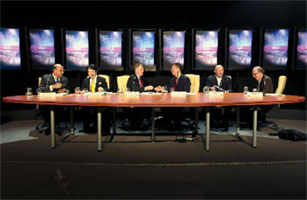
WORLD VIEW: TIME's panel of economists debated bailouts, recession and reform
(2 of 2)
This was a sentiment shared by everyone on the panel, although Roach was skeptical of whether it would ever happen. "We definitely need a more multilateral approach," he said. "The problem is there's no enforcement mechanism. There's no penalty for bad behavior. There's no reward for good behavior."
When Martin Wolf asked how the others hoped to see this collective action develop, the answers centered on the IMF and the G-20 — the grouping of top officials from 19 large economies and the European Union.
The problem with the current arrangement, both Manuel and Sahenk said, was that while developing countries generally had little choice but to obey the dictates of the IMF, big, wealthy nations such as the U.S. could ignore them — and the current crisis was in part a result of this. After all (and contradicting the view that the financial crisis was one of those unexpected "black swans" which nobody could predict), there has been no shortage of warnings that the U.S. economy was built on shaky foundations of personal debt and asset-price bubbles. "What can you do when countries continually ignore the advice of their peers and the advice of the multilateral institutions?" asked Manuel.
U.S. economic policy — and in particular its response to the current crisis — came under fire, and there were no U.S. officials on hand to defend themselves. Lawrence Summers, the top economic adviser in Barack Obama's White House, had planned to take part in the discussion, but canceled his trip to Davos shortly before everyone trudged their way through the snow to the Swiss mountain town. With lots of big economic decisions being made in Washington this week, especially on the shape of the Obama Administration's stimulus package, U.S. officials and lawmakers were in short supply.
Takenaka, a veteran of Japan's long and painful struggle to break out of a financial crisis, said that while it made sense to inject capital into banks — as the U.S. and several European countries have done — it wasn't going to work on its own. "What we need now is accurate assessment of assets, accurate measurement of assets," he said. "Because otherwise we cannot get the complete amount of what capital injections are needed."
Roach agreed that the key thing was to find a way to value and dispose of the bad debts on financial institutions' books. "The issue here is to develop a pricing mechanism for toxic assets," he said. That was the original goal of the Treasury Department's Troubled Asset Relief Program (TARP), introduced after the crisis really broke out into the open in September, but all the money so far has gone to capital injections. "Come on guys, let TARP be TARP," Roach said. Other U.S. bailout efforts, such as those intended to save the automobile industry, came under even more criticism. "Fiscal stimulus is exceedingly fashionable at the moment, but I cannot for the life of me resolve what tens of billions of dollars poured into the Detroit Three will do," said Manuel. "Sure, it will keep companies afloat, but what does it do for industrialization or anything else? What does it do for the real economy beyond sentiment?"
Silver Lining
Still, audience member Jacob Frenkel — a vice chairman of troubled U.S. insurer AIG and former governor of the Bank of Israel who was for many years an outspoken optimist at Davos — detected a "silver lining" in the current U.S. situation. "One of the problems we had last year was that there was an election in the United States, and we learned the lesson: Never have a financial crisis during an election year," he said. "We do not have an election year, so maybe there is a recovery."
But whether it's an election year or not, policymakers and financial institutions in the U.S. have tough choices to make — and to sell to an electorate that is seeing its employment prospects and retirement savings accounts wither. Nobody on the panel was cruel enough to blame the U.S. for the world's woes. "We got the benefit of globalization," said Turkey's Sahenk. "We all enjoyed these past 15 years. Let's stop blaming people. It's not the U.S., it's not us, it's not them." But in large measure, it could in fact be the choices that the Obama Administration now makes that will determine whether the mood at next year's Davos will be as dark as today's skies — or whether some shafts of sunlight will be apparent on the snow-covered Swiss mountains.